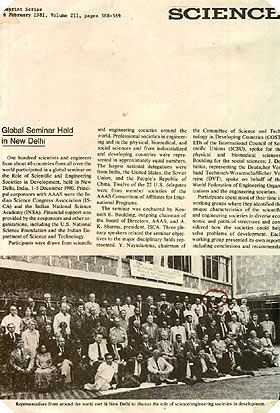Simon Schwartzman
Published in the Proceedings of the Global Seminar on the Role of Scientific and Engineering Societies in Development, New Delhi, AAS, INSA, ISCA, 1980, 394-400. Scientific planning and evaluation are
hotly disputed subjects; they often lead to the confrontation of two opposite
and abstract notions about how the scientific work is or should be organized,
understood and justified. The first notion emphasizes academic research as the
one more able to lead to intellectual development and creativity of the scientific
community, which in turn could provide the development of applied research and
technology as byproducts. The second favors applied research as the only way to
establish effective links between scientific research and social and economic
needs. In the latter's view, academic research should be considered only as an
eventually necessary input for the improvement of applied work.
Scientific planning and evaluation are
hotly disputed subjects; they often lead to the confrontation of two opposite
and abstract notions about how the scientific work is or should be organized,
understood and justified. The first notion emphasizes academic research as the
one more able to lead to intellectual development and creativity of the scientific
community, which in turn could provide the development of applied research and
technology as byproducts. The second favors applied research as the only way to
establish effective links between scientific research and social and economic
needs. In the latter's view, academic research should be considered only as an
eventually necessary input for the improvement of applied work. | IDEAL MODELS OF SCIENTIFIC ACTIVITY | |||
| "republic of science" | "technical progress " | "big science" | |
| goals | knowledge for its own sake | social and economic utility | organizational growth and strengthening |
| criteria of evaluation | by the consensus of the scientific community | through market mechanisms | through acknowledgment within the organization |
| rewards system | academic prestige and related benefits | according to the exchange value of technological products | organizational and bureaucratic power |
| appropriation of the product of scientific work | by acknowledgment through diffusion within the scientific community | patents and other forms of proprietary research | by the organization |
| type of science produced | "academic" science | "applied" science | "basic" science |